8下英语笔记整理
八年级下册第六单元英语笔记
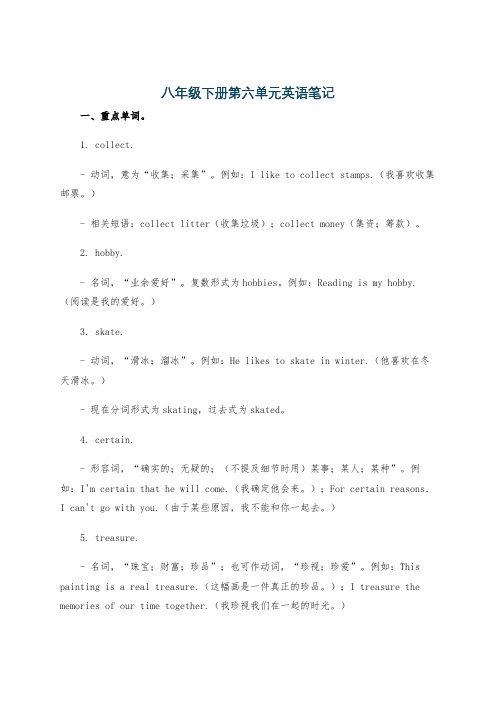
八年级下册第六单元英语笔记一、重点单词。
1. collect.- 动词,意为“收集;采集”。
例如:I like to collect stamps.(我喜欢收集邮票。
)- 相关短语:collect litter(收集垃圾);collect money(集资;筹款)。
2. hobby.- 名词,“业余爱好”。
复数形式为hobbies。
例如:Reading is my hobby.(阅读是我的爱好。
)3. skate.- 动词,“滑冰;溜冰”。
例如:He likes to skate in winter.(他喜欢在冬天滑冰。
)- 现在分词形式为skating,过去式为skated。
4. certain.- 形容词,“确实的;无疑的;(不提及细节时用)某事;某人;某种”。
例如:I'm certain that he will come.(我确定他会来。
);For certain reasons, I can't go with you.(由于某些原因,我不能和你一起去。
)5. treasure.- 名词,“珠宝;财富;珍品”;也可作动词,“珍视;珍爱”。
例如:This painting is a real treasure.(这幅画是一件真正的珍品。
);I treasure the memories of our time together.(我珍视我们在一起的时光。
)6. island.- 名词,“岛”。
例如:There is a beautiful island in the sea.(海里有一个美丽的岛。
)7. page.- 名词,“(书刊或纸张的)页;面;张”。
例如:Turn to page 10.(翻到第10页。
)8. hurry.- 动词,“匆忙;赶快”;名词,“匆忙;急忙”。
- 常用短语:hurry up(赶快;急忙(做某事));in a hurry(匆忙地;急于)。
例如:Hurry up, or we'll be late.(快点,否则我们要迟到了。
八年级下册人教版英语笔记

八年级下册人教版英语笔记一、Unit 1 What's the matter?1. 重点单词。
- matter:n. 问题;事情。
常用搭配:What's the matter (with sb.)? = What's wrong (with sb.)? = What's the trouble (with sb.)?(某人)怎么了?- sore:adj. 疼痛的;酸痛的。
例如:a sore throat喉咙痛。
- stomachache:n. 胃痛;腹痛。
- foot:n. 脚;足。
复数形式是feet。
- neck:n. 脖子;颈部。
- fever:n. 发烧。
have a fever发烧。
- lie:v. (lay - lain)躺;平躺。
lie down躺下。
- rest:v. & n. 放松;休息。
take breaks/take a break = have a rest休息。
- cough:v. & n. 咳嗽。
have a cough咳嗽。
- toothache:n. 牙痛。
2. 重点短语。
- have a cold:感冒。
- have a stomachache:胃痛。
- lie down and rest:躺下休息。
- drink some hot tea with honey:喝些加蜂蜜的热茶。
- see a dentist:看牙医。
- get an X - ray:拍X光片。
- take one's temperature:量体温。
3. 重点句型。
- What should I do? 我应该做什么?- You should see a dentist and get an X - ray. 你应该去看牙医并拍X光片。
- Should I put some medicine on it? 我应该在上面敷些药吗?- Yes, you should. / No, you shouldn't. 是的,你应该。
八年级下册英语四单元笔记
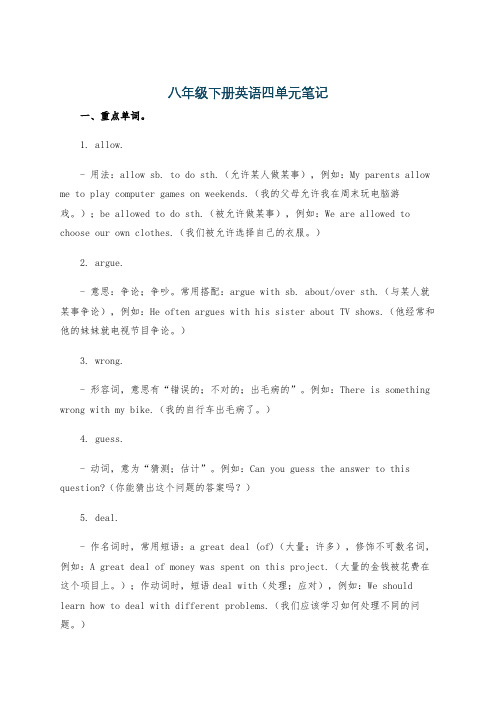
八年级下册英语四单元笔记一、重点单词。
1. allow.- 用法:allow sb. to do sth.(允许某人做某事),例如:My parents allow me to play computer games on weekends.(我的父母允许我在周末玩电脑游戏。
);be allowed to do sth.(被允许做某事),例如:We are allowed to choose our own clothes.(我们被允许选择自己的衣服。
)2. argue.- 意思:争论;争吵。
常用搭配:argue with sb. about/over sth.(与某人就某事争论),例如:He often argues with his sister about TV shows.(他经常和他的妹妹就电视节目争论。
)3. wrong.- 形容词,意思有“错误的;不对的;出毛病的”。
例如:There is something wrong with my bike.(我的自行车出毛病了。
)4. guess.- 动词,意为“猜测;估计”。
例如:Can you guess the answer to this question?(你能猜出这个问题的答案吗?)5. deal.- 作名词时,常用短语:a great deal (of)(大量;许多),修饰不可数名词,例如:A great deal of money was spent on this project.(大量的金钱被花费在这个项目上。
);作动词时,短语deal with(处理;应对),例如:We should learn how to deal with different problems.(我们应该学习如何处理不同的问题。
)6. relation.- 名词,意思是“关系;联系;交往”。
例如:The relation between the two countries is very important.(两国之间的关系非常重要。
八下英语笔记
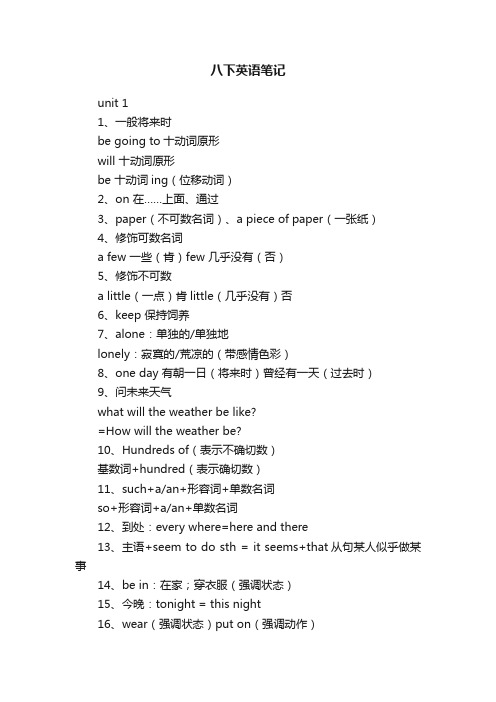
八下英语笔记unit 11、一般将来时be going to十动词原形will 十动词原形be 十动词ing(位移动词)2、on 在……上面、通过3、paper(不可数名词)、a piece of paper(一张纸)4、修饰可数名词a few 一些(肯)few 几乎没有(否)5、修饰不可数a little(一点)肯little(几乎没有)否6、keep 保持饲养7、alone:单独的/单独地lonely:寂寞的/荒凉的(带感情色彩)8、one day 有朝一日(将来时)曾经有一天(过去时)9、问未来天气what will the weather be like?=How will the weather be?10、Hundreds of(表示不确切数)基数词+hundred(表示确切数)11、such+a/an+形容词+单数名词so+形容词+a/an+单数名词12、到处:every where=here and there13、主语+seem to do sth = it seems+that从句某人似乎做某事14、be in:在家;穿衣服(强调状态)15、今晚:tonight = this night16、wear(强调状态)put on(强调动作)dress sb (给某人穿衣服)be in(强调状态)17、help sb( to) do sth(帮助某人做某事)help sb with sth(在某方面帮助某人)18、疑问词+do yor think+主+谓+其他Belive+that 从句19、…ago(…以前)用一般过去时宾语从句→用陈述句(主+谓)fly to +地点“in+一段时间”用“Hou long”提问There will be +主+其它(将会有)20、live to be + 年龄(活到…岁)it is +形+(for sb)to do sth对某人来说做某事怎么样look up (查找)fall in love with 人/物(爱上某人或某物)be able to = can(能;会)There be sb doing sth (有人正在做某事)worry about sb (担心某人)be used for (用来做什么)unit 21、某人怎么了?what`s wrong with sb?what`s the matter with sb?what`s the trorble with sb?what`s up?2、给某人打电话?Call sb up = ring sb up3、你认为某人某物怎么样?what do you think of sb/sth?=How do you like sb/sth?4、对主语来说borrow sth from sb (借进)lend sth to sb (借出)5、为某人买某物buy sth for sb = buy sb sth6、either(句末)否too (句末)肯also(在句中be动词/情/助之后,实义动词前肯)7、把某物归还某人return sb sth =return sth to sb和某人打架fight with sb = have a fight with sb8、get on 上车、相处建议advice (名)advise(动)9、各种各样all kinds of参加take part in+活动join+组织compare…with(与…比较)compare…to(把…比作)10、find sb doing sth 发现某人正在做某事advice sb to do sth 建议某人做某事see sb doing sth 看见某人正在做某事ask sb for help 寻求帮助argue with sb 与某人争论11、enough(修饰形/副词时enough 放在后)call sb at…(拨打电话…找…)特殊疑问词+动词不定式(to+动词原形)相当于名词:It`s time for +名(该是…时候)= It`s time to do sth13、sb spend 时间/钱+(in)doing sthsb spend 时间/钱+on sth(某人花费多少时间/钱做某事)sb+pay+钱for sth (某人为…付…钱)物+cost+sb+钱(某物花费某人多少钱?)It takes sb+时间to do sth(某花人费多少时间做某事)14、告诉某人(不要)做某事tell sb to do sthtell sb (not) to do sthmay be (也许)副may be(可能是)谓语unit 31、was/were+动ing (过去进行时)get out of (从…出来)be interested in(对…感兴趣)over = more than (超出)about = around(大约)2、when:两个动作可以同时发生、先后发生while:两个动作同时发生,从句常用进行时3、到达:arrive at + 小地点arrive in + 大地点get to + 地点reach + 地点4、imagine doing sth (想象做某事)imagine + that 从句5、感叹句what + a/an+单数名词+主+谓!how + 形/副+主+谓!6、shout at sb(对…大声喊)有责备之意Shout to sb (对…高声叫喊)7、in a tree(外来人或物在树上)on a tree(本身长在树上)发生:happen(偶然发生)、take place(计划中的事情)8、somewhere (某处)肯anywhere (任何地方)否定句或疑问问中everywhere (到处)肯定9、最后:finally(副)=at last =in the end10、evevy(日常的)形every day (每天)用在一般现在时unit 41、be mad at sb = be angry with sb 对某人生气不再not…anymore = no more (be动词之后,实义动词前) be supposed to=should 应该;应当be supposed to do sth 应当做某事2、take a message for sb 给某人捎口信leave a message 留口信3、be good at=do well in 擅长…+ed 的形容词→修饰人+ing的形容词→修饰物做某事遇到困难:have a hard time with sthhave a hard time doing sthwant to know = wonder 想知道4、be nervous 紧张的get nervous 变得紧张feel nervous 感到紧张luck(名)幸运lucky(形)幸运的ludeily(副)幸运地决定:decision(名词)>decide(动词)decide to do sth决定的做某事out of danger (脱离危险)in danger 危险(名词)dangerous 危险的(形容词)5、both…and(两者都)between…and (两者)之间open up one`s eyes (使某人开眼界)unit 51、let out 允许出去let in 允许进入or 用在否定/一般疑问句中and,用在肯定句中2、want sb to do sth 想要某人做某事ask sb to do sth 叫某人做某事3、why not +动词原形=why don`t you+动词原形all over the world = around the world 世界各地4、以…而闻名:be famous as +职业be famous for+原因cook 名词:厨师;动词:做饭cooker 炊具;cook sth for sb,为某人做某东西5、spend time with sb 和某人共度时光laugh at sb 嘲笑某人make +人+形容词(使某人处在…状态)had better (not) do sth 最好(不)做某事6、If+一般现在时,主句一般将来时7、make money 赚钱make a living(by)doing sth 靠做某事谋生8、be against sb/sth 反对某人/某事unit 61、现在完成进行时:have /has+been+动ing 现在完成进行时:①用for+一般时间②Since+过去时间点③Since+从句④Since+┅ago2、raise sth for sb 为某人筹集某物Several=a few基数词+and a half year=基数词+years and a half3、collect 收藏(动词)collector 收藏家(动词)collection 收藏品(名词)4、anyone=anybody作主语时,谓语动词用单数,用在否定句/疑问名/条件状语从语5、on one`s+序数词+birthday在某人的第几个生日6、finish doing sth 完成做某事7、准确数:基数+thousand不准确数:thousand+of8、How much ①对价钱提问;②对不可数名词数量提问9、be certain that从句(确信…)10、It`s+形容词+(for sb)+to +do+sth对某人来说,做某事怎么样11、“the+形容词比较级、the+形容词比较级”“越…越…”“形容词的比较级+and形容词比较级”“越来越…”12、enjoy doing sth“喜欢做某事”hear+that 从句(陈述句)14、East 东方东方的South 南方南方的+ernWest 西方西方的north 北方北方的15、far away 在远处far from 离…远16、用光run out of 主语是人run out 主语是物unit 71、Would you mind(not)doing sth? =Would you mind+if 从句你介意(不)做…吗?2、回答:不介意:①No,not at all②certainly not③of course not介意:①I`m sorry but…②I`m afraid…③Yes,You`d better not…3、right away (立刻,马上)=at once=right now →用在将来的时态中=in a minute4、Could you please (not)do sth?请你(不)做…好吗?5、工作任务work(不可数名词)job(可数名词)task (可数名词)它是一个令人困难、疲倦的工作6、complain about sth 抱怨做某事give---gave---givenbring---broughtbuy---boughtchoose---chose---chosen7、sth doesn't work=There is some thing wrong with sth某东西坏了8、形容词:annoying 使…生气的(物)annoyed 生气的(人)annoy 使…生气(动词)9、be friendly to sb 对某人友好be polite to sb 对某人有礼貌10、try to do sth 尽力做某事try not to do sth 尽力不做某事11、the way to +地点welcome to +地点(欢迎来到某地)12、否定前缀polite---impolite 礼貌Possible---impossible 可能13、小心:take care = be careful = look out take care to do sth小心做某事14、pick up:捡起;接人;搭车15、allow sb (not)to do sth允许某人(不)做某事be(not)allowed to do sth (不)被允许做某事17、keep(on) doing sth 继续做某事18、sth happens to sb 某事发生在某人身上happen to do sth 碰巧…19、即使even if =even thoughunit 81、why don't you do sth?=why not do sth?你为什么不做…2、get sb sth=get sth for sb给某人买某物3、How about…?=what about…?……怎么样4、scarf的复数,将f改为v,再加es scaves6、感叹句What+a/an+形+名词单数+主谓!What+形+名词复数/不可数名+主+谓!How+形/副+主+谓7、合成形容词基数词---单数名词---形容词例:5---year---old 5岁的8、too…to+动原形太…而不能…so…that 从句如此…以致not…enough to+动原形不够…做…9、called=named not…at all 一点也不10、be interested in…=take an interest in…对…感兴趣11、sleep(动、名)asleep(形、只作表语)sleepy (困倦的,有睡意的,但没有睡着,作定语)12、too many+可数名词的复数太多too much+不可数名词much too (太)14、rather than = instead of 而不是16、nearly=almost 几乎hardly 几乎不17、suggest(动)建议suggestion(名)可数名词不可数名词:advice18、suggest doing sth建议做某事make sb do sth让某人做某事encourage sb to do sth鼓励某人做某事20、除…之外except:(除…之外,其他都…)后面的人或物被排除在外besides(除…之外,还有…)后面的人或物包括在内make friends with sb和某人交朋友21、share sth with sb 和某人分享某物make progress 取得进步unit 91、have / has been to +地点曾经去过某地(不在原地,已回来)have / has gone to + 地点去了某地(去的路上/到了那个地方)2、neithor的用法(两者都不)1)neither+单数名词2)neithor of +人称代词/名词复数3)neither+be/助/情态动词+另一个主语(上面提到的否定情况,也适用于另一个主语)4)neither…nor…既不…也不…3、end up with=finish doing sth 以…结束4、在现在完成时中,短暂性动词不能与一段时间连用,必须转化延续性动词。
八下英语第一单元课堂笔记
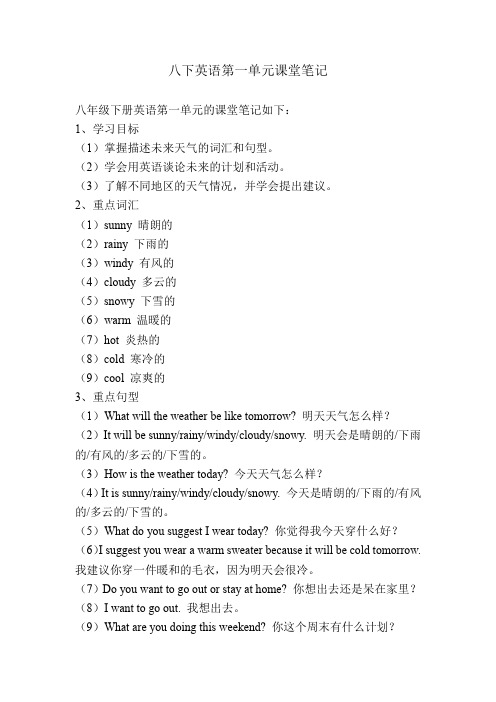
八下英语第一单元课堂笔记八年级下册英语第一单元的课堂笔记如下:1、学习目标(1)掌握描述未来天气的词汇和句型。
(2)学会用英语谈论未来的计划和活动。
(3)了解不同地区的天气情况,并学会提出建议。
2、重点词汇(1)sunny 晴朗的(2)rainy 下雨的(3)windy 有风的(4)cloudy 多云的(5)snowy 下雪的(6)warm 温暖的(7)hot 炎热的(8)cold 寒冷的(9)cool 凉爽的3、重点句型(1)What will the weather be like tomorrow? 明天天气怎么样?(2)It will be sunny/rainy/windy/cloudy/snowy. 明天会是晴朗的/下雨的/有风的/多云的/下雪的。
(3)How is the weather today? 今天天气怎么样?(4)It is sunny/rainy/windy/cloudy/snowy. 今天是晴朗的/下雨的/有风的/多云的/下雪的。
(5)What do you suggest I wear today? 你觉得我今天穿什么好?(6)I suggest you wear a warm sweater because it will be cold tomorrow. 我建议你穿一件暖和的毛衣,因为明天会很冷。
(7)Do you want to go out or stay at home? 你想出去还是呆在家里?(8)I want to go out. 我想出去。
(9)What are you doing this weekend? 你这个周末有什么计划?(10)I am going hiking with my family. 我打算和家人去徒步旅行。
4、语法重点(1)使用will表示未来时间的动作或状态。
(2)使用形容词描述天气状况。
(3)使用动词短语表达建议和意见。
八年级英语下册第三单元笔记

八年级英语下册第三单元笔记一、重点单词。
1. rubbish.- n. 垃圾;废弃物。
例如:There is a lot of rubbish on the street.(街道上有很多垃圾。
)2. fold.- v. 折叠;对折。
如:Fold the paper in half.(把纸对折。
)3. sweep.- v. (swept, swept) 扫;打扫。
例如:I sweep the floor every day.(我每天扫地。
)4. floor.- n. 地板;地面。
如:The book is on the floor.(书在地板上。
)5. mess.- n. 杂乱;不整洁。
例如:What a mess!(多么杂乱啊!)6. throw.- v. (threw, thrown) 扔;掷。
例如:Don't throw rubbish everywhere.(不要到处扔垃圾。
)7. neither.- adv. 也不。
用于否定句中,表示前面所说的情况也适用于后者。
例如:He doesn't like apples, neither do I.(他不喜欢苹果,我也不喜欢。
)- pron. 两者都不。
例如:Neither of them is right.(他们两个都不对。
)8. shirt.- n. 衬衫。
如:This is a white shirt.(这是一件白色的衬衫。
)9. pass.- v. 给;递;走过;通过。
例如:Pass me the salt, please.(请递给我盐。
);He passed the exam.(他通过了考试。
)10. borrow.- v. 借;借用。
例如:Can I borrow your pen?(我能借用你的钢笔吗?)11. lend.- v. (lent, lent) 借给;借出。
例如:I can lend you some money.(我可以借给你一些钱。
八年级下册英语第一到三单元笔记
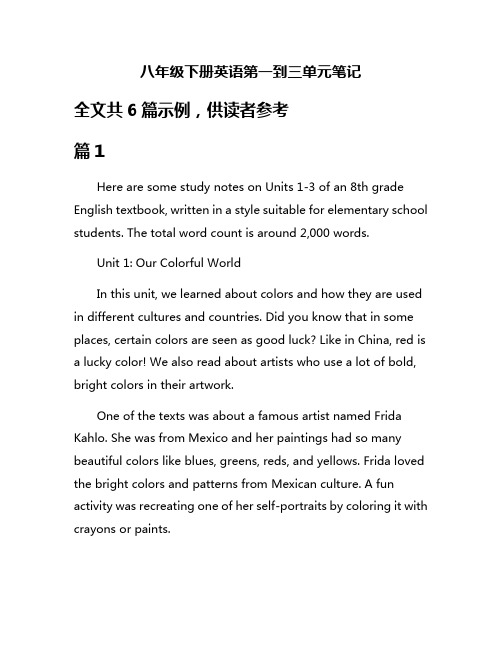
八年级下册英语第一到三单元笔记全文共6篇示例,供读者参考篇1Here are some study notes on Units 1-3 of an 8th grade English textbook, written in a style suitable for elementary school students. The total word count is around 2,000 words.Unit 1: Our Colorful WorldIn this unit, we learned about colors and how they are used in different cultures and countries. Did you know that in some places, certain colors are seen as good luck? Like in China, red is a lucky color! We also read about artists who use a lot of bold, bright colors in their artwork.One of the texts was about a famous artist named Frida Kahlo. She was from Mexico and her paintings had so many beautiful colors like blues, greens, reds, and yellows. Frida loved the bright colors and patterns from Mexican culture. A fun activity was recreating one of her self-portraits by coloring it with crayons or paints.We practiced describing colors using adjectives like "vibrant," "dull," "pale," and "rich." My favorite new word was "kaleidoscope" which means a toy that shows colorful, changing patterns when you look through it. Doesn't that sound amazing?There was also a crazy tongue-twister about colored creatures! "Purple prairie prairie dogs dug up purple prairie dog houses." Try saying that five times fast without messing up!Unit 2: Animal WondersThis unit was all about incredible animals from around the world. We read descriptions of animals with strange appearances or super cool abilities. Like the glass frog whose belly issee-through so you can see its organs! Or the mimic octopus that can change shapes to look like different sea creatures.My favorite was learning about ways animals adapt to survive in harsh environments. For example, camels can go a whole month without drinking water thanks to their humped back that stores fat. And emperor penguins incubate their eggs by balancing them on their feet and covering them with a flap of skin to protect them from Antarctic blizzards!We wrote fun compare and contrast paragraphs describing two different creatures. I compared a fast cheetah to a slow sloth.Using transition words like "however," "in contrast," and "on the other hand" made my writing much clearer.There were also listening exercises where we had to identify the featured animal just from hearing its cry or call. The orca whale's eerie sounds sent chills down my spine!Unit 3: Earth ExplorersFor this unit, we pretended to be brave explorers venturing across our planet's incredible landscapes and landforms. We learned vocabulary for different enviornments like "rainforest," "desert," "glacier," "volcano" and more. Then we read first-hand accounts of what it's like to actually visit those places.One chapter was about a family who went on a camping trip deep in the Amazon rainforest. They described the dense green jungle, heard the screeches of exotic birds, and even spotted camouflaged jaguars! Another tale was about mountain climbers who struggled up a steep icy glacier in Nepal. They used special spiked boots and ropes to conquer the slippery terrain. Those explorers are so brave!My favorite activity was designing our own "Exploration Survival Pack" filled with essential gear and supplies. I made sureto pack things like a water filter, rope, flares, and freeze-dried food pouches. You can never be too prepared for adventure!We wrapped up by giving persuasive speeches to convince people to visit a certain natural landmark. Using descriptive words, I was able to paint a picture of the Grand Canyon's majestic red-rock formations and make everyone wish they could see it in person.Those are the highlights from my English notes so far this semester! Learning about our fascinating world through stories and activities has been an amazing adventure. I can't wait to see what other thrilling topics we'll explore next.篇2Here are some English study notes on Units 1-3 of the 8th grade second semester English textbook, written from a middle school student's perspective (around 2000 words):English Study Notes - 8th Grade, Second SemesterUnit 1 - My AmbitionsThis unit was all about talking about our future hopes and dreams. We learned some really useful vocabulary like ambition,aspire, pursue, and accomplished. I thought it was cool getting to discuss what careers we might want when we're older.Some new grammar we covered:Going to for future plans (I'm going to be a doctor.)Will for predictions (He will make a great lawyer.)Present continuous for future arrangements (They're visiting colleges next month.)There were some reading passages about famous people like Serena Williams and their ambitions when young. I enjoyed the conversation practice talking about our own ambitions too.Unit 2 - The Internet WorldWow, this unit on the internet and technology was super interesting! We picked up lots of great vocab like website, download, username, password, and so on. Learning about internet safety was important too.New grammar from this unit:Present perfect (I have downloaded that app.)Present perfect vs. simple past (I've used that program. I used it yesterday.)Quantifiers like some, any, no (Are there any new updates?)The discussions on things like online gaming, social media, and cyber bullying were really relevant. My favorite was the group project making our own website designs!Unit 3 - Environmental ProtectionThis unit packed a serious message about taking care of our planet. Lots of new words like conservation, renewable, global warming, and carbon footprint. It opened my eyes to environmental issues.Grammar highlights included:Modals like should, must, have to (We should recycle more.) Passive voice (Forests are being destroyed.)Expressing obligation and prohibition (You mustn't litter.)The readings on topics like air pollution, vanishing rainforests, and ocean plastic were kind of scary but veryeye-opening. I liked the fun recycling contest we did as a class too.Overall, these three units gave me useful language for discussing my future, technology, and environmental protection. The projects like the website design and recycling contest weremy favorite parts. My English skills have really improved thanks to the variety of activities we did. Onward to the next units!篇3Here are English notes for Units 1-3 of the 8th grade second semester English textbook, written from the perspective of a middle school student in around 2000 words:Unit 1 - Saving the EnvironmentThis unit was all about how we can protect the environment and fight pollution and climate change. We learned a ton of new eco-friendly vocabulary like "recycle", "reuse", "reduce waste", "carbon footprint", and "sustainable living".The readings talked about really scary stuff like the hole in the ozone layer, deforestation, endangered species, and rising sea levels. It made me realize how much damage humans have done to the planet through littering, burning fossil fuels, and just being wasteful in general.But it also gave me hope that we can turn things around if we make some changes to our daily habits. Simple things like turning off lights, taking shorter showers, walking or bikinginstead of driving, and using reusable bags or bottles can add up to make a big difference.My favorite part was the group project where we had to come up with an idea for an environmental campaign or initiative at our school. My group decided to start a recycling competition between homerooms to see who could collect the most cans, bottles and paper over one month. The winners got to pick a local park or green space to do a cleanup day. It was a lot of work but really rewarding!Unit 2 - Modern MarvelsThis unit focused on incredible engineering feats and modern technological innovations that have changed our world. We read about giant construction projects like the Panama Canal, Golden Gate Bridge, and China's high-speed rail network.Some of the vocab was pretty tricky like "causeway", "suspension bridge", "aqueduct", and "reinforced concrete". But seeing all the pictures and diagrams of how these massive structures were designed and built was fascinating.We also learned about cutting-edge tech breakthroughs in fields like renewable energy, space exploration, medical science, artificial intelligence, and more. Mind-blowing stuff like bioniclimbs, self-driving cars, reusable rockets, and CRISPR gene editing.For the unit project, we had to research one modern marvel of our choice and put together a presentation explaining how it works and its impact on society. I did mine on the Large Hadron Collider at CERN. It was intense but I geeked out learning all about particle physics and the search for the Higgs boson!Unit 3 - Cultural TraditionsThis unit was a fun deep dive into different cultures around the world and how they celebrate their histories and identities through festivals, holidays, music, art, food, and more.We learned new words for cultural concepts like "heritage", "indigenous", "ritual", "artisan", and "oral tradition". The readings exposed us to cool celebrations and customs like Spain's La Tomatina, Mexico's Día de los Muertos, the Holi festival of colors in India, and the intricate tradition of Aboriginal didgeridoo making.My favorite activity was the in-class cultural fair, where each student set up a booth showcasing a different country or ethnic group. We brought in traditional dress, music, decorations, andfood to share with our classmates. I represented Japan and made origami cranes to hand out.For the final project, we had to write a short story or comic incorporating at least three distinct cultural traditions or elements from societies we studied. I blended Mongolian throat singing, Brazilian capoeira, and Ethiopian coffee ceremonies into an cool adventure tale. Getting creative really helped solidify everything I'd learned.Overall these three units opened my eyes to the wider world in different ways - environmentalism, technological progress, and appreciation for cultural diversity. Lots to process but I feel like a became a bit of a global citizen!篇4Here are English notes for Units 1-3 of the 8th grade second semester English textbook, written in a style suitable for elementary school students, approximately 2000 words long:English Notes for 8th Grade Units 1-3Unit 1: Festivals Around the WorldFestivals are cool! People celebrate them in different ways in different countries. Some festivals are about religion, some are about seasons changing, and some are just for fun.One awesome festival is Diwali in India. It's the Festival of Lights! People decorate their homes with lots of lamps and lights. They make rangoli patterns on the floor using colored powders or sand. Rangoli designs are so pretty! People also eat delicious sweets during Diwali.Another fun festival is Lunar New Year in China and other Asian countries. Families get together and have a big meal with lucky foods like dumplings and noodles. Kids get red envelopes with money inside as gifts! There are also dragon and lion dances with bright, colorful costumes.Way down in Brazil, they have a wild festival called Carnaval! It happens right before Lent. People dance in the streets wearing crazy costumes and masks. There are huge parade floats covered in feathers, sequins and lights. The music and energy look amazing!No matter what festival it is, people celebrate by eating yummy food, wearing fun costumes, and being with family and friends. Festivals bring people together!Unit 2: Extreme SportsSome sports are not for the faint of heart! These crazy extreme sports will get your heart pumping for sure. From skiing down huge mountains to swinging through the jungle, extreme athletes love an adrenaline rush!One intense extreme sport is free solo rock climbing. Climbers scale huge rock faces without any ropes or safety gear, just using their hands and feet! Alex Honnold is a famous free solo climber who has conquered massive cliffs like El Capitan in Yosemite. His skills are insane but it looks terrifying!Kitesurfing or kiteboarding is another wild one. Riders have a board attached to their feet and use a big kite to pull them across water at high speeds! They can do crazy jumps and flips in the air. If the wind dies down, they'll crash right into the water. Ouch!Maybe the craziest extreme sport is BASE jumping - that stands for building, antenna, span and earth. Jumpers parachute off super tall objects like cliffs, skyscrapers or bridges! They freefall for just a few seconds before pulling their parachute. One small mistake and it could be a total disaster. Yikes!While these sports seem nuts, the athletes train really hard and know what they're doing. As fun as they look, maybe it's best to get your thrills on a safe rollercoaster instead!Unit 3: Our Changing PlanetOur beautiful planet Earth is always changing and shifting. Some changes happen quickly while others take place over millions of years. Learning about these changes can help us understand the world better.One major change is the movement of tectonic plates deep inside the Earth. These giant rocky plates very slowly ram into each other, pulling apart or sliding past one another. This motion, just a few inches per year, causes earthquakes, volcanoes and even creates mountains and oceans over time.The Earth's surface is also changing from erosion by wind and water. Rivers and streams carve valleys and canyons. Wind picks up sand and rocks and wears down surfaces. Coastlines shift as waves crash and reshape the land. Even raindrops can slowly eat away at rocks over long periods of time.The climate and weather patterns around the globe are shifting too. Ice caps and glaciers are melting, sea levels are rising, and we're seeing more extreme weather events likehurricanes, droughts and heatwaves. Scientists think human activities that release greenhouse gases are a big factor in these climate changes.While some of Earth's changes can be dangerous or destructive, many also create amazing scenic wonders. Change can be good! It's the endless cycles and processes that shape our dynamic planet.篇5Here are some notes on Units 1-3 of the 8th grade English textbook, written in English from the perspective of a middle school student, around 2000 words long:Units 1-3 NotesHey there! It's me again, ready to share my thoughts on the first few units of our 8th grade English textbook. Get ready for a rollercoaster ride of new words, grammar rules, and exciting stories!Unit 1: FriendshipsThis unit was all about the importance of friends and how to be a good friend. We learned a bunch of new vocabulary wordslike "loyalty," "considerate," and "trustworthy." I never knew there were so many words to describe what makes a great friend!One of the reading passages was about two best friends who had a misunderstanding and stopped talking to each other. It made me realize how valuable true friends are and that we should always try to work things out instead of letting silly arguments come between us.The grammar focus was on using relative clauses to give more details about people or things. Like, "My best friend, who loves playing basketball, is always there for me." Kinda confusing at first, but I think I've got the hang of it now.Unit 2: Outdoor AdventuresThis unit was a real adventure! We learned all about different outdoor activities like camping, hiking, and rock climbing. Some of the new words we studied were "gear," "terrain," and "navigate." I never knew there were so many fancy words for outdoorsy stuff!My favorite part was reading the story about a group of kids who got lost on a hiking trip. It was super suspenseful, and I was on the edge of my seat wondering if they'd find their way back! I also loved the descriptions of the beautiful natural scenery.Grammar-wise, we focused on using adverbs to modify verbs and adjectives. Like, "The hikers walked slowly through the densely forested area." Adverbs really help paint a clearer picture in your mind.Unit 3: Inventions and DiscoveriesThis unit was all about cool inventions and discoveries that have changed the world. We learned words like "innovative," "groundbreaking," and "revolutionary." I was blown away by how many amazing things humans have come up with over the years!One of the reading passages was about the invention of the printing press and how it made books more accessible to everyone. It was fascinating to learn about how one invention could have such a huge impact on the spread of knowledge.For grammar, we practiced using the passive voice to talk about things being acted upon. Like, "The first printing press was invented by Johannes Gutenberg." It's a different way of structuring sentences, but I can see how it's useful for putting the focus on the action rather than who did it.Overall, these first few units have been a blast! I've learned so many new words, cool grammar rules, and interesting stories.English class is definitely keeping me on my toes, but I'm loving the challenge. Bring on the rest of the year!篇6Here are some notes on Units 1-3 of the 8th grade English textbook, written in the voice of an elementary school student in about 2000 words:English Class Notes - 8th Grade Units 1-3Unit 1 - My Daily RoutineThis unit was all about talking about our daily schedules and routines. It had lots of new vocab words like "wake up", "get dressed", "have breakfast", and time words like "in the morning", "at night", etc.We learned how to use simple present tense verbs to describe habits and routines. Like "I wake up at 7 AM" or "She brushes her teeth after dinner." Using time expressions with these was important too.There were dialogues where people asked "What time do you get up?" and you had to respond with your wake up time. We also wrote paragraphs describing our typical day from when we wake up to when we go to bed.The grammar was pretty straightforward but there were some irregular verbs to watch out for, like "wake up" instead of "wake". Overall it was a good review of present tense after learning it way back in earlier grades.Unit 2 - Heroes and Role ModelsThis unit was my favorite because it was all about cool heroes and people to look up to. We read stories about firefighters, scientists, athletes, and other inspiring people.There was lots of new vocabulary for describing personalities and characteristics. Words like "brave", "determined", "intelligent", "role model". We had to pick a role model and write about why we admire them using these descriptive words.The grammar focused on using "be" verbs in present and past tense. So sentences like "He is a brave firefighter" and "She was an amazing scientist who discovered a cure for that disease."Towards the end we looked at modals like "can", "should", "have to" and how to use them correctly. Like "Teachers should be good role models" or "I have to study hard to become a scientist like Marie Curie."We also did fun activities where we drew portraits of our role models and wrote descriptive captions using the vocabulary andgrammar from the unit. I enjoyed learning about extraordinary people.Unit 3 - Let's Explore NatureOkay, this unit was about nature, animals, plants, and exploring the outdoors. We learned tons of nature words like "forest", "waterfall", "species", "extinct", and names of different plants and animals.The readings were really interesting, like articles about amazing places in nature, protecting endangered animals, and environmental problems like pollution and deforestation.There were dialogues where people talked about their camping and hiking experiences. We had to write our own too, like "Last summer, I went camping in the mountains. I saw a bear and it was scary!" Using past tense was key here.The grammar focused on comparing things using comparatives and superlatives. Like "That waterfall is taller than this one" or "The blue whale is the largest animal on Earth." We had to put adjectives in the right form.There were also "if...then" conditional sentences about nature. Like "If we recycle, then we can save trees" or "If animals' habitats are destroyed, then they will become endangered."At the end we did a fun project making posters about endangered animals using everything we learned in the unit. Some people's posters were so creative!Those are my notes on the first three units of eighth grade English. We covered a lot of useful grammar and vocabulary for daily life, describing people, and nature/animals. Can't wait to see what the next units are about!。
八下英语笔记
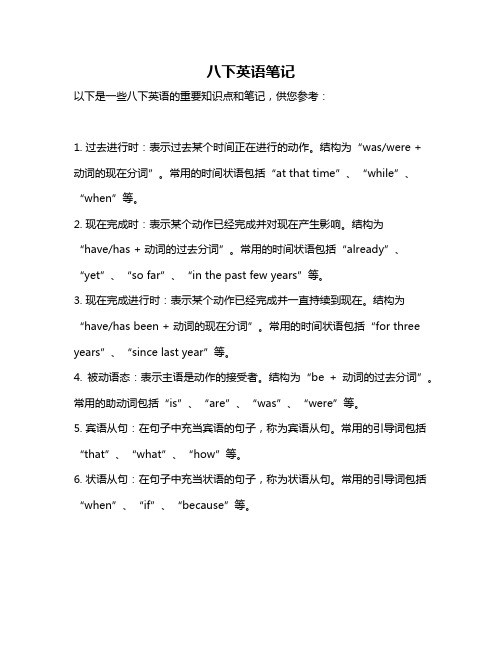
八下英语笔记以下是一些八下英语的重要知识点和笔记,供您参考:1. 过去进行时:表示过去某个时间正在进行的动作。
结构为“was/were + 动词的现在分词”。
常用的时间状语包括“at that time”、“while”、“when”等。
2. 现在完成时:表示某个动作已经完成并对现在产生影响。
结构为“have/has + 动词的过去分词”。
常用的时间状语包括“already”、“yet”、“so far”、“in the past few years”等。
3. 现在完成进行时:表示某个动作已经完成并一直持续到现在。
结构为“have/has been + 动词的现在分词”。
常用的时间状语包括“for three years”、“since last year”等。
4. 被动语态:表示主语是动作的接受者。
结构为“be + 动词的过去分词”。
常用的助动词包括“is”、“are”、“was”、“were”等。
5. 宾语从句:在句子中充当宾语的句子,称为宾语从句。
常用的引导词包括“that”、“what”、“how”等。
6. 状语从句:在句子中充当状语的句子,称为状语从句。
常用的引导词包括“when”、“if”、“because”等。
7. 虚拟语气:表示与实际情况相反的情况或不可能实现的愿望。
结构为“would/could/might + 动词的过去分词”。
常用的时间状语包括“if only”、“in my dreams”等。
8. 情态动词:表示推测或意愿的动词,常用的情态动词包括“can”、“may”、“must”、“should”等。
9. 不定代词:表示不确定的人、事物或数量的代词,常用的不定代词包括“some”、“any”、“no”、“every”、“all”等。
10. 介词:表示名词、代词与动词之间的关系,常用的介词包括“at”、“in”、“on”、“with”、“by”等。
人教版八下英语u8笔记

人教版八下英语u8笔记
以下是有关人教版八下英语u8的笔记,供您参考:
Unit 8 grammar
一、被动语态的构成:
被动语态由助动词be和及物动词的过去分词构成,其基本结构为“be+及物动词的过去分词”。
使用被动语态时需要根据时态和人称进行变化。
二、被动语态的时态:
被动语态有多种时态,包括一般现在时、一般过去时、一般将来时、现在进行时、过去进行时、现在完成时、过去完成时等。
具体形式如下:
1. 一般现在时:am/is/are+过去分词
2. 一般过去时:was/were+过去分词
3. 一般将来时:will be+过去分词
4. 现在进行时:am/is/are being+过去分词
5. 过去进行时:was/were being+过去分词
6. 现在完成时:have/has been+过去分词
7. 过去完成时:had been+过去分词
三、被动语态的用法:
被动语态常用于以下情况:
1. 不知道或不想指出动作的执行者。
2. 强调动作的承受者。
3. 在科技文献和新闻报道中,为了强调客观事实。
4. 在一些习惯用法中,如“It is said that…”(据说……)和“He will be invited to the party.”(他将受邀参加聚会。
)等。
四、主动语态与被动语态的转换:
将主动语态转换为被动语态的方法是将宾语变成主语,将谓语变成被动结构(be+过去分词),将原主语放在by后面,作为被动句中的宾语。
如果原主语不出现,被动句中常常以it作为形式主语。
八年级下册英语第四单元笔记

八年级下册英语第四单元笔记一、重点单词1、 allow (v)允许;准许用法:allow sb to do sth 允许某人做某事例句:My parents don't allow me to stay up late 我的父母不允许我熬夜。
2、 wrong (adj)错误的;不对的常见短语:go wrong 出毛病;弄错例句:Something is wrong with my bike 我的自行车出毛病了。
3、 guess (v)猜测;估计名词形式:guesswork 猜测;臆测例句:Can you guess the answer? 你能猜出答案吗?4、 deal (n)协议;交易常用短语:a great deal of 大量;许多例句:We made a deal 我们达成了协议。
5、 relation (n)关系;联系;交往形容词形式:related 有关系的;相关的例句:The relation between them is very good 他们之间的关系很好。
6、 communication (n)交流;沟通动词形式:communicate 交流;沟通例句:Good communication is important in a family 在一个家庭中,良好的沟通很重要。
7、 argue (v)争吵;争论名词形式:argument 争吵;争论例句:They often argue about small things 他们经常为小事争吵。
8、 cloud (n)云;云朵形容词形式:cloudy 多云的例句:There are many clouds in the sky 天空中有很多云。
9、 elder (adj)年纪较长的辨析:elder 通常用于表示家庭成员之间的长幼关系;older 则用于比较年龄大小。
例句:My elder brother is two years older than me 我哥哥比我大两岁。
人教英语八下_Unit 1 Section A 重点单词笔记

人教版八年级下册各单元重点单词笔记Unit1 SectionA1.mattern.问题;事情(1)询问某人的情况=problem重点句型怎么了? What’s the matter (with sb.)? 注意这里的the必须要加What’s wrong with sb.? What’s up? What’s the problem/trouble with sb.?互换(2)表示一个问题或一件事情e.g. They had some important matters to discuss.(3)关于...的问题a matter of sth./doing sth.e.g. Making a plan is a matter of choosing the best time and activities.补充:no matter who/what/when/where 无论...v.有影响matter to sb. 对某人有影响It doesn’t matter to me what you do. 你做什么对我没影响(你做什么我无所谓)2.重要的名词(身体部位)(下列均可数)arm n. 手臂back n. 背,背部ear n. 耳朵eye n. 眼睛foot n. 脚(复数为feet)hand n. 手head n. 头leg n. 腿mouth n. 嘴巴neck n. 脖子nose n. 鼻子stomach n. 胃tooth n. 牙齿(复数为teeth)3.表达生病的用法总结(用have表示得了某种病)(1)have a +疾病名称have a cold/fever/cough 感冒/发烧/咳嗽发高烧have a high fever He is coughing (2)have a +部位+ache n.表示疼痛have a stomach ache/tooth ache/head ache(3)have a +sore adj. 疼痛的;酸痛的+疼痛部位have a sore throat/back——have a very /really sore throat/back√4.liev. ①躺lie-lying-lay-laine.g. As long as you lie down and rest, you will feel much better tomorrow.The bus driver saw an old man lying on the side of the road.①撒谎lie-lying-lied-liede.g.lie to sb. 对某人说谎Don’t lie to me!n. 谎言tell a lie5.restn. ①休息时间(睡眠时间)have/take a good rest①剩余部分;其余the rest of sth.e.g. I would like to spend the rest of my life living with you.v. =relax 休息;放松e.g. Rest your eyes every half an hour.He won’t rest until he finds her.6.breakv. break-broke-broken已学,之前笔记有n. 间歇,休息,暂停(指短暂地歇了一下)①lunch/tea/class break 午饭/下午茶/课间的休息时间①take a break/ take breaksHe worked all day without a break=He worked all day without taking a breakYou need to take breaks away form the computers.7.hurtv. hurt-hurt-hurt①hurt sb./hurt oneself 使疼痛;使受伤He hurt his back /himself when he played tennis outside.If your head and neck still hurt tomorrow, then go to the doctor.①hurt oneself doing sth. 做某事弄伤了自己John hurt himself cutting up the carrots.①hurt one’s feeling 伤害某人的感情/使不快It hurt me to know that he lied to me.adj. 受伤的None of the passengers were badly hurt.8.off adv./prep. 本身意义一般指远离,主要总结含有off的动词短语get off 下车-get on 上车turn off 关上-turn on 打开take off 脱下;飞机火箭的起飞发射put off 推迟cut off 切除take/have three days off 请三天假9.to one’s surprise 一般位于句首,单独用(逗号隔开)10.onto prep. 本身意义一般指朝,向e.g. Some passengers helped Mr.Wang to move the man onto the bus11.troubleUCN(不可数名词). 困难;苦恼e.g. People don’t want to help others because they do not want any trouble.①be in trouble处于困境中Although we are in trouble, we won’t give up.e.g. Now he is in trouble, we should try our best to help him①get (sb.) into trouble (使某人)陷入困境中e.g. If I don’t arrive home on time, I’ll get into trouble!My brother always gets me into trouble with my parents.①have trouble with sth.=have trouble (in) doing sth.做某事有困难e.g. His son had trouble (in)working out the math problem.I had trouble in understanding the meaning of the word.补充:同义的还有have difficulties/problems with sth.=have difficulties/problems (in) doing sth. trouble也可做可数名词,意思是一件麻烦事,烦心事V. 使烦恼,使忧虑;麻烦某人trouble sb.e.g. Sorry to trouble you, but could you tell me the time?What is troubling you these days?12.hitV. hit-hit-hit击;打;撞击①hit sb. (with sth.)e.g. Bus No.26 hit an old man on Zhonghua Road.My parents never hit me when I was a child.①hit sb. +prep.+ the 身体部位hit me on the head/hit him in the facee.g. She hit him on his head with her umbrella.补充:hit常用于被动语态be done e.g. I was hit by a stone.13.right away =at once= in a minute= immediately 立刻;马上The old man had a heart problem and needed to go to the hospital right away.。
八年级英语下册知识点总结
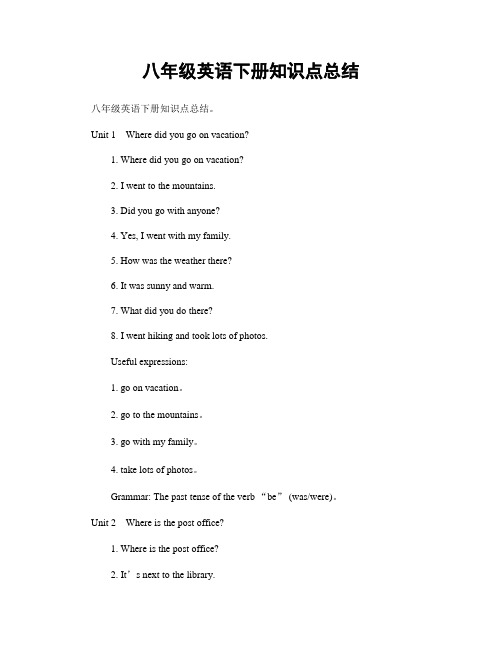
八年级英语下册知识点总结八年级英语下册知识点总结。
Unit 1Where did you go on vacation?1. Where did you go on vacation?2. I went to the mountains.3. Did you go with anyone?4. Yes, I went with my family.5. How was the weather there?6. It was sunny and warm.7. What did you do there?8. I went hiking and took lots of photos.Useful expressions:1. go on vacation。
2. go to the mountains。
3. go with my family。
4. take lots of photos。
Grammar: The past tense of the verb “be” (was/were)。
Unit 2Where is the post office?1. Where is the post office?2. It’s next to the library.3. How do I get to the bookstore?4. Go straight and turn left at the first corner.5. Is there a supermarket near here?6. Yes, there is. It’s across from the park.7. How far is it from here?8. It’s about 10 minutes’ walk.Useful expressions:1. next to。
2. across from。
3. turn left/right。
八年级下册英语笔记重点归纳

八年级下册英语笔记重点归纳一、Unit 1 What's the matter?1. 重点单词。
- matter n.问题;事情。
常用搭配:What's the matter (with sb.)?(某人)怎么了?- have a cold 感冒。
类似的表达还有:have a fever(发烧),have a cough (咳嗽)等。
- stomachache n.胃痛;腹痛。
“-ache”为后缀,表示疼痛,如:headache (头痛),toothache(牙痛)。
- foot n.脚,复数形式为feet。
- lie v.躺;平躺。
lie - lay - lain。
例如:You should lie down and rest.(你应该躺下休息。
)- rest v. n.放松;休息。
如:take a rest(休息一下)。
2. 重点短语。
- take one's temperature 量体温。
例如:The nurse took my temperature.(护士给我量了体温。
)- take breaks (take a break) 休息。
We should take breaks when we are tired.(当我们累的时候应该休息。
)- get off 下车。
He got off the bus at the next stop.(他在下一站下了公共汽车。
)- to one's surprise 使……惊讶的是;出乎……的意料。
To my surprise, he passed the exam.(令我惊讶的是,他通过了考试。
)- What should I do? 我应该做什么?用于询问建议。
- You should see a dentist and get an X - ray. 你应该去看牙医并且拍个X 光片。
should为情态动词,后接动词原形,表示建议。
八年级下册英语人教版第四单元笔记

八年级下册英语人教版第四单元笔记Unit 4I. 词汇1. tradition n. 传统2. custom n. 习俗3. celebrate v. 庆祝4. gather v. 聚集5. treat v. 款待6. decorate v. 装饰7. delicious adj. 美味的8. feast n. 盛宴9. admire v. 赞美10. common adj. 常见的II. 词组1. based on 以...为基础2. cook a turkey 烹饪火鸡3. give thanks to 祈谢4. fall down 跌倒5. in memory of 纪念6. make a wish 许愿III. 语法1. 被动语态:主动语态和被动语态的构成及应用。
2. 情态动词should:表示建议、规定、习俯等用法。
3. if引导的条件状语从句:if引导的条件状语从句的用法。
IV. 作文1. My Favorite FestivalWrite an article about your favorite festival, introducing its customs, traditions, and what you like the most about it.V. 阅读理解Every culture has its own set of unique traditions and customs. Here are a few customs from around the world:1. In Japan, people celebrate Hanami, which is a festival to admire cherry blossoms in the spring.2. In Mexico, Day of the Dead is a holiday where families gather to remember and honor deceased loved ones.3. In India, Diwali is a festival of lights where people decorate their homes with candles and lamps.4. In the United States, Thanksgiving is a holiday where families come together to feast and give thanks for the blessings of the past year.VI. 交际用语1. How was your weekend?2. What did you do for Christmas?3. Did you have a good time at the party?4. How do you celebrate New Year's Eve?5. Have you ever tried traditional Chinese food?VII. 课外阅读Read a short story or article about a cultural festival from another country, and write a summary of what you learned.VIII. 练习Complete the sentences with the correct form of the verbs in brackets:1. They __________ (decorate) the Christmas tree last night.2. The turkey __________ (cook) by Sarah for Thanksgiving dinner.3. Diwali __________ (celebrate) in India with fireworks and lights.4. Day of the Dead __________ (remember) loved ones who have passed away.IX. 国际交流Share with a partner about a traditional festival from your culture and ask them about a festival from their culture. Discuss the customs, traditions, and similarities/differences between the two festivals.X. 课堂表现Participate actively in class discussions, ask questions, and share your thoughts on different cultural festivals. Take notes on new vocabulary and grammar structures learned in this unit.以上为八年级下册英语人教版第四单元的笔记内容,希會能对您有所帮助。
英语八下冀教版笔记
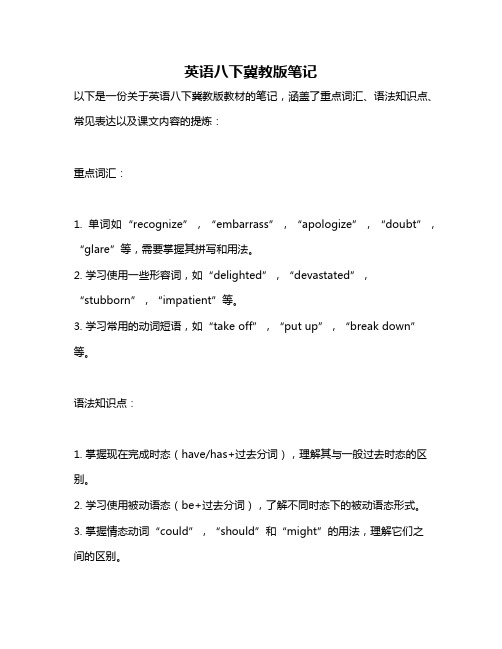
英语八下冀教版笔记以下是一份关于英语八下冀教版教材的笔记,涵盖了重点词汇、语法知识点、常见表达以及课文内容的提炼:重点词汇:1. 单词如“recognize”,“embarrass”,“apologize”,“doubt”,“glare”等,需要掌握其拼写和用法。
2. 学习使用一些形容词,如“delighted”,“devastated”,“stubborn”,“impatient”等。
3. 学习常用的动词短语,如“take off”,“put up”,“break down”等。
语法知识点:1. 掌握现在完成时态(have/has+过去分词),理解其与一般过去时态的区别。
2. 学习使用被动语态(be+过去分词),了解不同时态下的被动语态形式。
3. 掌握情态动词“could”,“should”和“might”的用法,理解它们之间的区别。
常见表达:1. 学习使用一些常用的英语习语和俚语,如“It’s not my cup of tea.”,“That’s a stretch.”。
2. 学习用英语表达建议和意见,如“I think we should...”,“How about...”。
3. 掌握一些常用的表达方式,如“I’m sorry to hear that.”,“It’snot fair.”。
课文内容提炼:课文主要讲述了主人公在成长过程中所遇到的各种挑战和困难,以及如何通过努力和坚持克服这些困难。
同时,课文中也强调了友谊、家庭和团队精神在成长过程中的重要性。
通过学习课文,学生可以更好地理解成长的意义,学会珍惜身边的人和事,并培养积极向上的心态。
以上是一份关于英语八下冀教版教材的笔记,希望对你有所帮助。
八年级下册英语unit8笔记

八年级下册英语Unit 8笔记一、词汇1. Diverse(adj. 不同的,多种多样的)例句:The city has a diverse population, with people from many different countries living together.2. Heritage(n. 遗产,传统)例句:The town has a rich cultural heritage, with many old buildings and traditional events.3. Conflict(n. 冲突,争执)例句:The two countries are in conflict over the ownership of the territory.4. Embrace(v. 拥抱,接受)例句:Themunity needs to embrace the new ideas and work together for a better future.5. Transform(v. 转变,改变)例句:The new government 本人ms to transform the education system for the better.6. Engage(v. 参与,吸引)例句:Thepany needs to engage with its customers to improve its products and services.二、短语1. Get along with(与……相处融洽)例句:I get along with my classmates and we often study together.2. Look forward to(期待,盼望)例句:I'm looking forward to the summer vacation and the trip to the beach.3. Stand out(显眼,出众)例句:Her talent and dedication make her stand out among her peers.4. Be made up of(由……组成)例句:Themittee is made up of experts from various fields.5. In honor of(为了纪念,为了表彰)例句:The event is held in honor of the soldiers who sacrificed their lives for their country.6. In addition to(除……之外)例句:In addition to studying, she also enjoys playing the piano in her free time.三、语法1. 形容词和副词的比较级和最高级形容词和副词的比较级和最高级表示事物在某一方面的程度高低或顺序,一般由比较级+than连接两者进行比较,最高级前常与the连用。
英语八年级下册第七单元笔记

英语八年级下册第七单元笔记一、重点单词。
1. square.- n. 平方;正方形。
例如:The area of this square is 100 square meters.(这个正方形的面积是100平方米。
)- adj. 平方的;正方形的。
如:a square box(一个正方形的盒子)2. meter.- n. 米;公尺。
它是长度单位,复数形式是“meters”。
例如:The building is 50 meters high.(这栋楼50米高。
)3. deep.- adj. 深的;纵深的。
例如:The river is very deep.(这条河很深。
)- adv. 深深地。
如:dig deep(深挖)4. desert.- n. 沙漠。
例如:The Sahara Desert is very large.(撒哈拉沙漠非常大。
)- v. 舍弃;遗弃。
如:He was deserted by his friends.(他被他的朋友们遗弃了。
)5. population.- n. 人口;人口数量。
提问人口数量用“What's the population of...?”例如:What's the population of China?(中国的人口是多少?)注意:population作主语时,谓语动词的单复数形式要根据情况而定。
如果表示人口的整体概念,谓语动词用单数;如果表示人口中的具体人数,谓语动词用复数。
如:The population ofthe city is large.(这个城市的人口众多。
)One third of the population here are workers.(这里三分之一的人口是工人。
)6. Asia.- n. 亚洲。
例如:China is in Asia.(中国在亚洲。
)7. tour.- n. 旅行;旅游。
例如:They are on a tour of France.(他们正在法国旅行。
八年级下册英语六单元笔记
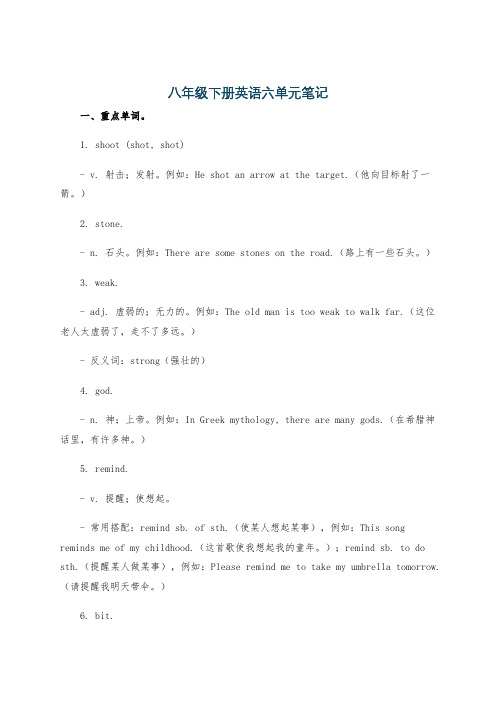
八年级下册英语六单元笔记一、重点单词。
1. shoot (shot, shot)- v. 射击;发射。
例如:He shot an arrow at the target.(他向目标射了一箭。
)2. stone.- n. 石头。
例如:There are some stones on the road.(路上有一些石头。
)3. weak.- adj. 虚弱的;无力的。
例如:The old man is too weak to walk far.(这位老人太虚弱了,走不了多远。
)- 反义词:strong(强壮的)4. god.- n. 神;上帝。
例如:In Greek mythology, there are many gods.(在希腊神话里,有许多神。
)5. remind.- v. 提醒;使想起。
- 常用搭配:remind sb. of sth.(使某人想起某事),例如:This song reminds me of my childhood.(这首歌使我想起我的童年。
);remind sb. to do sth.(提醒某人做某事),例如:Please remind me to take my umbrella tomorrow.(请提醒我明天带伞。
)6. bit.- n. 一点;小块。
- 常用短语:a little bit(有点儿),例如:The box is a little bit heavy.(这个盒子有点儿重。
)7. silly.- adj. 愚蠢的;不明事理的。
例如:It was silly of you to make such a mistake.(你犯这样的错误真愚蠢。
)- 近义词:stupid, foolish。
8. object.- n. 物体;物品。
例如:I can't see the small object clearly.(我看不清这个小物体。
)- v. 反对。
八下英语第二单元笔记

八下英语第二单元笔记以下是八下英语第二单元的笔记,希望对您有所帮助。
一、重点单词1. vacation n. 假期2. exciting adj. 令人兴奋的3. disagree v. 不同意4. agree v. 同意5. rent v. 租用6. beach n. 海滩7. because conj. 因为8. headache n. 头痛9. cough n. 咳嗽10. fever n. 发烧二、重点短语1. stay at home 待在家里2. go to the mountains 去山上3. go to the beach 去海滩4. visit museums 参观博物馆5. go to the movies 看电影6. stay in bed 卧床休息7. have a good time 过得开心8. feel like doing sth 想做某事9. go for a walk 去散步10. practice doing sth 练习做某事三、重点句子1. I want to go somewhere interesting. 我想去有趣的地方。
2. We’re planning to go to New York for vacation. 我们计划去纽约度假。
3. She would rather stay at home than go out in the rain. 她宁愿待在家里也不愿出去淋雨。
4. He is considering renting a car. 他正在考虑租一辆车。
5. I hope to have a restful vacation this year. 我希望今年能度过一个轻松的假期。
八下英语笔记人教版手写

八下英语笔记人教版手写 English Answer:Unit 1。
Vocabulary:weather words.feelings and emotions.daily routines.Grammar:present simple tense.present continuous tense.present perfect tense.simple past tense.Communication:talking about the weather.expressing feelings and emotions. describing daily routines.Unit 2。
Vocabulary:school subjects.classroom objects.school activities.Grammar:comparative and superlative adjectives. possessive pronouns.reflexive pronouns.modal verbs.Communication:talking about school subjects.describing classroom objects.discussing school activities.Unit 3。
Vocabulary:food and drinks.restaurant vocabulary.shopping vocabulary.Grammar:present progressive tense.past progressive tense.future simple tense.future continuous tense.Communication:ordering food and drinks in a restaurant. going shopping.talking about food and drinks.Unit 4。
- 1、下载文档前请自行甄别文档内容的完整性,平台不提供额外的编辑、内容补充、找答案等附加服务。
- 2、"仅部分预览"的文档,不可在线预览部分如存在完整性等问题,可反馈申请退款(可完整预览的文档不适用该条件!)。
- 3、如文档侵犯您的权益,请联系客服反馈,我们会尽快为您处理(人工客服工作时间:9:00-18:30)。
8下英语笔记整理Unit 1—101)What’s the problem/trouble/matter withsb?=What’s wrong with you?=What’shappened to sb?怎么了?2)Look well/healthy 看起来很健康3)Get windy 起风了4)The other day 前几天5)就近原则:either……or不是……就是neither……nor不是……也不是not only……but also 不仅……而且there be6)An all—you—can—eat meal自助餐7)By accident/chance意外8)much too adj. too much un..too many cn. 太9)right away=in a minute=at once =rightnow立刻10)get\move sb. onto the bus把xx搬到车上11)in time 及时on time 准时12)on both sides of the road=on either sideof the road在路两边13)think twice 再三考虑14)get off the bus下车(大车)get on thebus上车(大车)15)get out of the car 下车(小车)get in thecar上车(小车)16)act quickly立刻行动17)take action 采取措施18)take sb to sp把某人带到某地19)expect to do/sb to do/+句子期待20)wait for sb/sth等待21)can’t wait to do 迫不及待做某事22)to one’s surprise 令某人吃惊的是23)be surprised to do/at sth/+句子感到吃惊……24)agree to do/with sb 同意……disagree不同意25)It is said that 据说It is sad that 可悲的是26)get into/out of trouble陷入/摆脱困难27)have trouble/problems/difficulty (in)doing sthhave trouble/problems/difficulty with sth 做某事有困难28)be always doing 表达一种情感倾向29)take care of =care for =look after=babysit照顾30)learn sth by oneself=teach oneself自学enjoy oneself玩得高兴help oneself to sth 请自用make oneself at home 随意些hurt oneself 伤到自己say to oneself 自言自语lose oneself in 沉浸于……leave sb by oneself=leave sb alone把某人单独留下buy oneself sth 给自己买introduce oneself介绍自己31、a piece of advice =a suggestion 一条建议advise sb to doadvise doingadvise that sb should do 建议……31)have a nosebleed 流鼻血 a runningnose 流鼻涕32)be sick=be ill 生病33) a sick boy 生病的男孩an ill boy=abad boy坏男孩34)get/be hit on the head by sth被击中头部35)be serious about=take sth seriously 严肃对待36)what else/other things happened?还发生了什么?37)Hit sb in+部位(软)Hit sb on+部位(硬)38)be taken to the hospital被带到医院39)get/be sunburned 被晒伤40)sb run out of sth=sb use up sth某人用光了某物sth run out=sth be used up某物用光了41)be used to doing 习惯做某事used to do曾经常常做某事be used to do 被用来做什么42)take risks to do冒险做某事risk one’s life to do冒生命危险去做43)find oneself sp不知不觉发现自己走到了44)in a dangerous situation在危险的情境中45)be caught被压be caught in the rain淋雨Catch a cold 感冒catch up with sb 赶上某人46)时间/距离/金钱用is47)by oneself =alone 独自48)save his own life拯救他自己的生命49)be/get ready for sth/to do 准备好做某事50)so that 以便于so adj./adv. that如此……以至于such n. that 如此……以至于51)while/after/before/when doing52)lose one’s life失去某人的生命53)mean doing意味着Mean to do 故意做某事54)the importance of health健康的重要性55)decide/make a decision to do 决定做某事56)one’s love for sth某人对xx的爱57)keep/go on doing继续做某事58)experience v. 经历cn.经历un.经验59)give/hand out发下去hand in收上来60)think up=come up with想出61)put off doing 推迟做某事62)set up 建立63)call sb up=call up sb 打电话给某人64)put up 张贴65)volunteer v.志愿n.志愿者volunteer to do\volunteer sth to do66)notice sb do/doing 注意到某人……67)give up doing 放弃做某事68)主肯反否,主否反肯never,hardly,nothing,seldom等有否定意思的词,反问用肯定,词语前缀后缀不管69)start/begin doing/to do 开始做某事70)make a plan to do=plan to do 计划做某事71)at the same time 同时72)a strong feeling of satisfaction强烈的满足感73)the look of joy 开心的表情74)on one’s face75)at the age of 4=when sb was 4 在4岁76)try out for 参加……的选拔77)in one’s eyes 在某人的眼里78)go on a journey=travel to sp旅行79)can’t help doing情不自禁做某事80)put of sth until 把xx推迟到81)be busy doing/with 忙于做某事82)worry about=be worried about 担心83)in one’s free/spare time 在某人的空闲时光84)a good way to do=a good way of doing做某事的好方法85)a host on the radio 电台主持人86)a children’s home 孤儿院87)in need 在需要帮助的时候88)be proud of对……感到骄傲89)not……any more=no more 不再(强调数字)Not……any longer=no longer 不再(强调动作)90)take one’s order点菜Order sb to do命令某人做某事Order sth 预定91)be able to do能做92)be sure to do 确信93)the+adj.表示这一类人94)imagine doing 想象95)bring sth here 带来take sth there带去96)talk to/with sb about/of sth97)have a good understanding of sth 对……有一个好的了解98)send sb to sp 把某人送到某地99)in what other way 用其他什么方式100)volunteer as sth充当……的志愿者101)have interest in sth=be interested in sth 对……感兴趣102)a place of interest 景点103)be strong in sth =be good at sth擅长104)certainly=of course 当然105)get a ride=give sb a ride 让某人搭车106)work on 致力于107)a few=several几个108)return=go back回来【return不与back 连用】109)what a mess好乱啊110)give sb a warm welcome 热烈欢迎某人111)walk the dog=take the dog for a walk遛狗112)否定:neither/nor+助/情态/be+sb肯定:so+助/情态/be+sb113)the whole day =all day一整天114)shout at 吼shout to喊115)find sth/sb adj./n.Find it adj.for sb to do发现……116)coffe or tea,which one would you like?①Either,I don’t mind(都可以)②Neither,I’d like some water(都不要)117)borrow sth from sb从某人那里借到某物Lend sb sth=lend sth to sb借给某人某物118)try/try one’s best to do尽力做某事119)what for=why=how come120)be careful with sth 小心使用某物121)under too much stress/pressure在太大的压力下122)prons and cons of sth 什么的好处与坏处123)in order to do以便于124)mind sb doing介意某人做某事125)be stressed out=be tired 心力交瘁的126)there is no need for sb to do sth=it’s not necessary for sb to do 对某人来说没必要做某事127)provide sb with sth=provide sth for sb=offer sb sth =offer sth to sb提供某物给某人128)environment n.环境environmental adj.环境的environmentall adv. 环境地129)in one’s opinion/view=according to sb/sth 就xx看来130)it’s helpful for their future development 有助于他们将来的发展131)depend on sb 依靠某人it/that depends 看情况132)it’s fair to do 做什么是公平的it’s unfair to do做什么是不公平的133)do one’s part in doing sth 尽xx的本分做某事134)I have no idea =I don’t know我不知道135)as a result 作为一个结果136)be/fall ill 生病137)agree with sb同意某人disagree with sb 不同意某人138)be responsible for 对……负责任139)so as to【不放句首】=in order to =to 为了,表目的140)allow doing/sb to do允许做某事sb be allowed to do 某人被允许做某事141)study until midnight学习到半夜142)get on well with others 和……相处得好143)have a fight/an argument 有争执Fight for sth 为……而战fight against sth 与什么做抗争144)explain sth /explain to sb /explain sb sth 解释145)give sth back to sb=give sb sth back=return sth to sb 把xx还给某人146)it’s not a big deal不是大事 a great deal 大量it’s a deal 成交147)refuse to do 拒绝做某事148)instead【可放句中】instead of doing I didn’t do homework,instead,I played.I didn’t do homework,I played instead. 149)whatever=no matter 无论150)so adj./adv. thatSuch n. that 如此,以至于151)so that/in order that+句子In order to/to/so as to+do以便于152)way to do=way of doing做……得方法153)sb used to do过去常常做某事Sb be used to doing 习惯做某事154)sth run out=sb run out of sth=sb use up sth=sth be used up xx 用完了155)be under the control of sb=be in control of sb在……的掌控中Keep sth under control让……处于掌控之中156)have confidence in sb 对某人有信心157)pay sb M for sth 支付给某人多少钱为了某物158)it’s kind of you=you are kind159)take sth with sb随身携带160)both 的全否定neither all的全否定none161)be in trouble=get into trouble 陷入麻烦162)mean to do故意做mean doing 意味着163)you’d better do/not do 你最好做/不做164)in future 从今以后in the future 在将来165)with one’s permission在某人的允许下166)believe in=trust 信任167)borrow sth from sb【借入】Lend sb sth=lend sth to sb【借出】168)compete with sb 和某人竞争169)make progress 取得进步170)I totally/completely agree我完全统一171)continue doing/to do继续做某事Let’s continue=Let’s go on172)it’s typical of sb to do 对某人来说做什么很平常173)compare sth to sth 把什么比做什么174)win sth赢得什么beat sb in sth 在某方面打败某人175)cut out=delete删除176)can hardly do 几乎不能做某事177)benefit sb 让某人收益178)think for oneself独立思考179)express one’s opinion表达某人的观点180)be suitable for sb 适合某人181)be against sth/doing 反对be for sth/doing 支持182)so far=after now 到家目前为止183)get all wet 全湿了184)all of a sudden=suddenly突然185)catch up with赶上某人186)be busy with sth/doing sth 忙于做某事187)bring sb home 把某人带回家188)join sb in doing/to do 加入某人189)be reason why+句子……的原因190)realize one’s dream 实现某人的梦想191)no wonder+句子难怪192)make it to sth 成功做某事193)the rest of my life我的余生194)take care of=look after=babysit=care for 照顾195)take care =look/watch out=be careful 小心196)point to 被指出197)once upon a time 很久以前198)at the other side另外一边199)be weak in sth =be not good at sth 不擅长什么200)finally =at last=in the end 最后201)enjoy success at sth=succeed in doing=be successful in doing成功做某事Fail to do 失败做某事failure失败者202)call out 宣布203)recently=not long ago最近204)send sb to do sth拍某人去做某事send for a doctor 派人去叫医生205)remind sb of sth 使某人想起某事Remind sb to do提醒某人做某事206)a grown elephant=an adult elephant 一头成年的大象207)a solution of sth ……的解决办法208)a little/a bit/a little bit+adjA little/a bit of n.209)replace 代替210)keep(on)doing 坚持做某事211)go on a journey to sp 去某地旅行212)energetic=full of energy 充满能力的,有活力的213)be loyal to sb 对某人衷心214)turn into 变成215)come out 出版【不能用被动语态】be published 被出版【可用被动】216)become/be interest in sth=show/have (an)interest in sth 对……感兴趣217)be new to sb 对某人来说很新鲜218)It’s a tradition to do 做某事是一个传统219)more than=over超过220)give birth to sb 生育某人221)break sth into pieces把……弄成碎片222)be pleased with sth 对某事感到高兴223)lead sb to sp 带某人到某地224)All roads lead Rome 条条大路通罗马225)sb can’t do=sb be too adj. to do=sb be not adj. enough to do某人不能做某事226)fit 指大小、尺寸合适suit指颜色、款式合适227)be famous as 作为……出名be famous for 为……出名be famous to 在某些人中出名228)keep sth for oneself私自把……保存起来229)all the+n.=the whole+n.全部的230)follow one’s advice采纳某人的意见follow suit 随大流As follows 原因如下231)be made of 由什么制成【看得出材料】Be made from 由……制成【看不出材料】Be made in 在什么地方被制造出来Be made into 被制成什么232)in fact =actually事实上233)a little/a bit/a lot/much/even/still/far 修饰比较级234)world wonders世界奇迹235)feel free to do随便做什么236)as far as I know据我所知237)as you can see 正如你所看到的238)achieve your dream实现你的梦想【可用被动】239)even though=even if=though=although虽然、即使240)force sb to do逼迫某人做某事by force 通过武力241)take a deep breath 深呼吸242)序数词/最高级后的动词用to do243)cover v.遮盖n.封面be covered with sth 被……遮盖Cover sth with sth 用……遮盖……244)risk one’s life doing冒生命危险做某事245)at birth=when it was born 出生时246)live up to xx years活到多少岁247)what’s the size of sth→how big?问大小What’s the length of sth→how long问长度What’s the weight of sth→how heavy?问重量What’s the depth of sth→how deep?问深度What’s the width of sth→how wide 问宽度What’s the height of sth→how high 问高度248)endangered animal濒危动物249)sp is home to sth 某地是某物的故乡250)walk into sb 撞到某人251)run over to sp with excitement激动地跑到某地252)be special to sb对某人来说很特别253)die from【外因】die of【内因】死于……254)or so 用在数词后,大约255)rules on sth……的规则256)protect sb from doing保护某人免受……的伤害257)full of =be filled with满是……fill sth with sth 用什么装满什么258)be due到时间了due to=because of 因为259)choose sb to do 选择某人做某事260)hurry to sp 急忙到某地261)call/name sb sth 给某人起名叫什么262)left behind 被留下的263)grow your hair long 留长头发264)mark of another man’s feet 另一个人的脚印265)come to life 苏醒266)a fan of sth……的粉丝267)at home and abroad国内外268)belong to 属于269)be the home to/of sth……的故乡270)one another 【三者及以上】each other【两者】互相271)put trust on sb=trust sb 相信某人272)the beauty of sth ……的美丽273)laugh at sb嘲笑某人274)do some research on sth =research sth 调差某事275)introduce sb to sb 把某人介绍给某人276)mix of sth ……的混合277)at the end of the day 天黑时278)encourage sb to do鼓励某人做某事discourage sb to do 让某人泄气279)advise doing=advise sb to do建议……280)learn of/about 了解到learn (how)to do学习做某事281)make progress in sth 在某方面有进步282)make peace with sb 和某人和好283)the 最高级sb have ever done例:He is the laziest boy I have ever done 他是我见过最懒的男孩284)have been to 去了回来了have gone to 去了还没回来have been in 在哪儿待了多久285)with a special theme 有一个特别的主题286)give sb a ride =get a ride 搭便车287)have a gift for sth=be talented in sth 在某方面有天赋288)hear from 受到某人的来信289)take a ride on the boat=have a boat ride 坐船290)be theme with sth 以什么为主题291)make a cup of tea 泡一杯茶292)be prepared/ready for 为……做好了准备293)on the one hand ……on the other hand一方面……另一方面294)whether……or ……不论……还是……295)during the daytime 在白天296)be close to 靠近a closed friend 亲密的朋友297)sth belong to sb= Sb own sth=sth it’s sb’s 某物属于某人298)people in need 需要的人299)bring back sweet memory 带回甜蜜的回忆300)part with 与……分开301)by the way 顺便一提302)clear out清理出303)to be honest =to tell the truth 老实说304)have special meaning to sb 对某人来说有特殊意义305)check out检查306)one last thing 最后一件事307)It works/helps 起作用308)be junior to 比……低级be senior to 比……高级309)bring joy to sb 给某人带来快乐310)what do you do with?=how do you deal with sth?怎样处理?What do you deal with ?你在处理什么?311)sometime某个时候some time 一段时间Sometimes有时some times 几次/几倍312)be certain to do 肯定要做某事Be certain of/about sth对某事有把握Be certain of doing 有把握做某事313)serve sb with sth用……招待某人314)search A for B 在A里找B315)consider sb as 把……看做316)It’s a shame +句子……是个耻辱317)notice sb do/doing 注意到……318)count up to 10 数到10319)stay the same 一尘不变320)【现在完成时】have/has done①表示已经完成的事②表示过去发生的动作,强调对现在的影响标志:already,not……yet,never,just,before【单独使用】,recently,twice 等表次数的词汇,so far【目前为止】,in the last/past fewer years 近几年,over the years 最近几年③表示过去已经开始,持续到现在【continue situation】标志:for+段时间,since+过去式句子/过去的时间点/three years ago注:否定句直接在助动词后面加not疑问句将助动词提前【注】短暂性动词→延续性Borrow→keep buy→have put on→wear catch a cold→have a coldGet to know =know get to sleep=sleep begin/start→be onGo out→be out close→be closed open→be open get to→be (in)Die→be dead leave→be away finish/end→be over fall asleep→be asleep。
